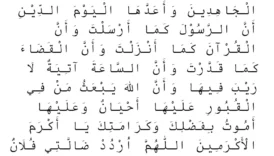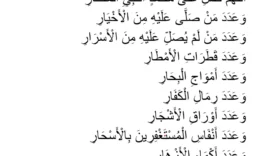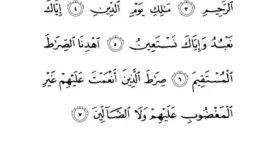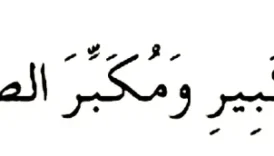Prayer to Recite Before Entering the Bathroom
Introduction
In the Islamic tradition, following the Prophet’s (peace be upon him) guidance in all aspects of daily life is key to finding spiritual harmony and divine protection. This even extends to using the bathroom—a place we often view purely in physical or practical terms. However, by reciting a simple yet profound prayer before entering, we not only uphold a Prophetic practice but also remind ourselves of our constant reliance on God’s protection.
- Prayer to Recite Before Entering the Bathroom
- Introduction
- Why Recite a Prayer Before Entering the Bathroom?
- Recommended Prayers from the Prophet (peace be upon him)
- 1. Short Invocation
- 2. Longer Invocation
- Variations in the Hadith Literature
- Explanation of Key Terms
- Hubth and Habâ’ith
- Historical Context: The “Hushûsh”
- Practical Benefits of This Prophetic Practice
- Conclusion
- References
Why Recite a Prayer Before Entering the Bathroom?
From an Islamic perspective, humans are vulnerable to both visible and invisible harm. While we can see some threats—like germs—others, such as jinn (supernatural beings), remain unseen. By seeking God’s refuge before entering the restroom, believers acknowledge their complete dependence on the Creator for safety and well-being. This act of consciousness transforms an otherwise routine moment into one of spiritual mindfulness.
Recommended Prayers from the Prophet (peace be upon him)
1. Short Invocation
Arabic Text:
اللَّهُمَّ إِنِّي أَعُوذُ بِكَ
Transliteration (Latin Script):
Allahumma inni a‘ûdhu bika
English Meaning:
“O Allah, truly I seek refuge in You.”
2. Longer Invocation
Arabic Text:
أَعُوذُ بِاللَّهِ مِنَ الْخُبُثِ وَالْخَبَائِثِ
Transliteration (Latin Script):
A‘ûdhu billâhi min al-khubthi wal-khabâ’ith
English Meaning:
“I seek refuge in Allah from male and female demons (and all kinds of impurities).”
Variations in the Hadith Literature
- Narration from Anas (may Allah be pleased with him):
The Prophet (peace be upon him) would say, “O Allah, I seek refuge in You” before entering the bathroom. In another narration, he is quoted as saying, “I seek refuge in Allah from the jinn and all impurity.” - Commentary by Abû Dâvud:
He notes that there are slight variations in how the narration was reported: some mention “O Allah, I seek refuge in You” while others simply say “I seek refuge in Allah.” Despite the differences, the core message remains that one should seek divine protection before entering such private spaces.
Explanation of Key Terms
Hubth and Habâ’ith
- Hubth (حُبْث): Plural for “khabeeth,” typically referring to male devils or evil influences.
- Habâ’ith (خَبَائِث): Plural for “khabeethah,” referring to female devils or detrimental forces.
Within a broader context, these terms can signify various forms of wrongdoing or harm, such as sinful speech, unlawful foods, or other spiritually detrimental elements. Thus, the prayer encompasses a plea for protection from all manner of negativity.
Historical Context: The “Hushûsh”
In early Islamic history—particularly in Madinah—dedicated restrooms were not always common. People often used the natural cover of trees, especially clusters of palm trees known as “hushûsh.” Over time, simple outdoor structures crafted from palm branches were also called hushûsh. This historical setting helps us understand why the Prophet (peace be upon him) emphasized spiritual protection even in such settings.
Practical Benefits of This Prophetic Practice
- Spiritual Mindfulness
By pausing to recite a short prayer, we elevate a mundane act into an opportunity for worship and remembrance of God. - Moral and Spiritual Safeguard
Seeking refuge in Allah keeps our intentions in check, discouraging us from slipping into any form of moral or spiritual negativity. - Physical Hygiene
While the prayer addresses the unseen, it also complements the Islamic emphasis on cleanliness—reminding us to be mindful of hygiene in all aspects of life.
Conclusion
Reciting a brief prayer before entering the bathroom is a simple, deeply meaningful Sunnah that fosters spiritual awareness and divine protection. Whether we find ourselves in a modern restroom or an older, more rustic facility, the underlying principle remains the same: our faith and trust are ultimately in Allah, who alone can shield us from harm—both seen and unseen.
References
- Sünen-i Ebû Dâvud
- Avnü’l-Ma’bûd (c.7, s.6)
- Buhârî, Vudû’
- Tirmizî, Tahâret
(These classical works offer further insights into bathroom etiquette, the recommended duʿās, and general practices related to personal hygiene in Islamic teachings.)





